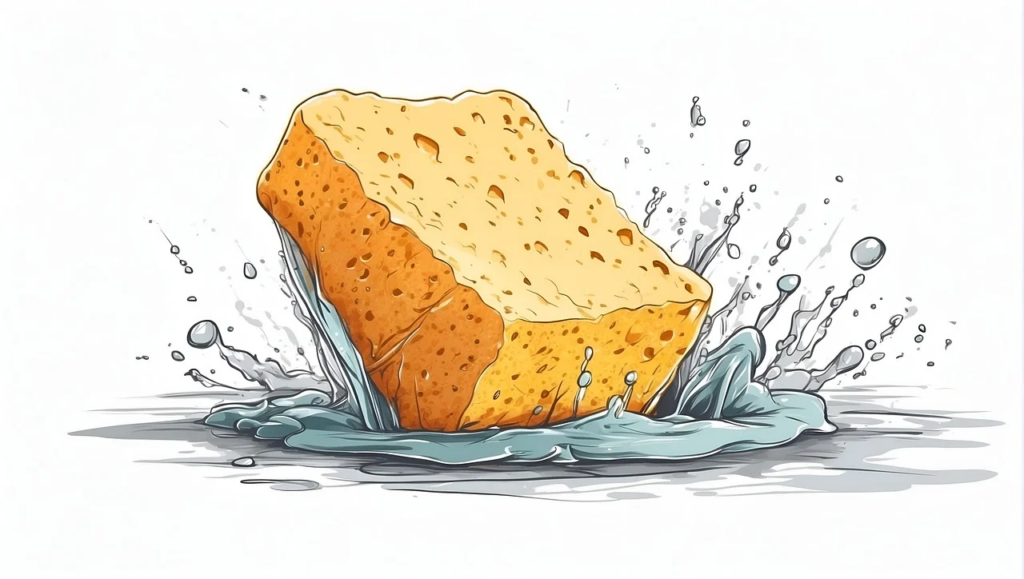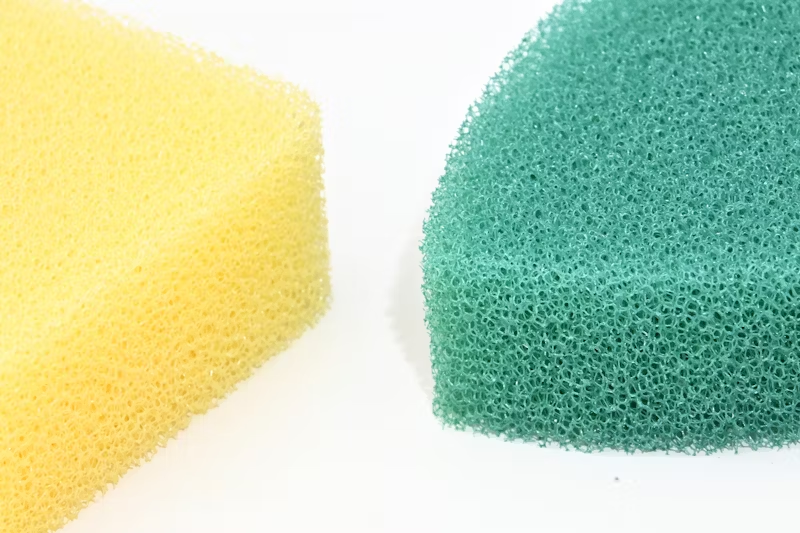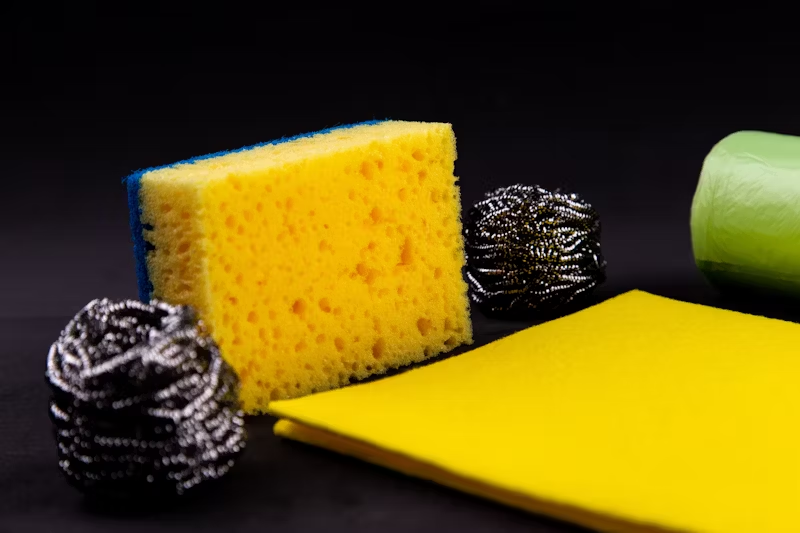Your kitchen sponge might seem like an innocent cleaning tool, but beneath its soft, porous surface lies a breeding ground for bacteria. Studies show that sponges are among the dirtiest items in your home, potentially spreading germs and putting your health at risk. Let’s explore how this everyday item can harm your health and what you can do to maintain a safer, cleaner kitchen.
Sponges: A Perfect Breeding Ground for Bacteria

Did you know your kitchen sponge could harbor more bacteria than your toilet seat? Sponges are constantly exposed to moisture and food particles, creating an ideal environment for harmful microbes like Salmonella, E. coli, and Staphylococcus aureus.
In fact, a single sponge can contain billions of bacteria—far exceeding the human population on Earth. Each time you use it, you risk transferring these germs to your dishes, countertops, and hands, effectively spreading contamination instead of eliminating it.
Why Cleaning Methods Often Fail
Think microwaving or boiling your sponge will solve the problem? Unfortunately, these methods aren’t as effective as you might think. While high heat kills some bacteria, the most resilient strains often survive and multiply.
Studies have found that sanitized sponges can actually harbor a higher percentage of harmful bacteria compared to untouched sponges. These hardy survivors form stronger colonies, making your well-meaning cleaning efforts counterproductive.
How Sponges Spread Germs in Your Kitchen
Instead of cleaning surfaces, sponges often spread bacteria around your kitchen. Each swipe transfers microbes to new areas, including utensils, hands, and even food preparation spaces.
Using the same sponge repeatedly amplifies the problem. It’s like trying to clean a muddy floor with a dirty mop—ineffective and potentially hazardous. The longer you use a single sponge, the greater the risk of widespread contamination.
Why Sponges Stay Dangerous Longer

Unlike brushes or silicone scrubbers that dry quickly, sponges tend to stay damp between uses. This constant moisture creates a paradise for bacteria, allowing them to thrive and multiply.
Even if you wring out your sponge and store it properly, it’s unlikely to dry completely. Over time, this damp environment not only fosters bacterial growth but also attracts mold and mildew, further compounding the health risks.
Bad Odors Are a Warning Sign
Ever noticed a foul smell coming from your sponge? That unpleasant odor is a clear signal that harmful bacteria have taken over.
The culprit is often bacteria like Moraxella osloensis, which produces the musty smell and is linked to infections in people with weakened immune systems. If your sponge smells bad, it’s not just gross—it’s a health hazard. Replace it immediately.
Your Sponge Could Be Dirtier Than Your Toilet

Here’s a startling fact: a single cubic centimeter of sponge can contain as many bacteria as feces. The porous structure of sponges traps microbes deep within, making them nearly impossible to clean thoroughly.
Each use exposes you to these pathogens, increasing your risk of foodborne illnesses. It’s an unsettling reality for an item so closely associated with cleanliness.
Raw Meat Cleanup: A Recipe for Disaster
Cleaning up raw meat juices with a sponge is one of the riskiest mistakes you can make. Sponges absorb these juices, which often contain dangerous bacteria like Campylobacter and Salmonella.
These pathogens can survive in your sponge, spreading to other surfaces and utensils. To minimize cross-contamination, use disposable paper towels or disinfectant wipes for cleaning up after handling raw meat.
Old Sponges Are the Worst Offenders
The older your sponge, the more bacteria it harbors. Even with regular cleaning, microbial diversity increases over time, creating a dangerous mix of germs.
Experts recommend replacing your sponge every one to two weeks. Holding onto an old, smelly sponge for longer is like keeping a petri dish in your kitchen.
How to Reduce the Risks of Using Sponges

Thankfully, you don’t have to abandon sponges entirely. By adopting better habits, you can reduce their risks and maintain a safer kitchen.
- Replace Sponges Frequently: Swap out your sponge every one to two weeks, or sooner if it starts to smell.
- Use Alternative Tools: Consider switching to brushes, silicone scrubbers, or disposable cleaning pads. These options are less likely to harbor bacteria.
- Avoid Using Sponges for Raw Meat Cleanup: Use paper towels or disinfectant wipes to clean surfaces after handling raw meat.
- Store Sponges Properly: Wring out your sponge thoroughly after each use and store it in a well-ventilated area to promote faster drying.
- Disinfect Surfaces Regularly: Use kitchen-safe disinfectants to keep countertops and other surfaces germ-free.
The Benefits of Hygienic Cleaning Alternatives
Switching to more hygienic cleaning tools can make a big difference. Brushes and silicone scrubbers dry faster, reducing the chance for bacteria to multiply. Disposable cleaning pads are also a great option for high-risk tasks, like cleaning up after raw meat.
These alternatives not only improve hygiene but also offer greater durability and efficiency, saving you time and effort in the long run.
Conclusion: A Cleaner, Safer Kitchen Starts with Smarter Choices
Your kitchen sponge may seem harmless, but it’s one of the dirtiest items in your home. From harboring billions of bacteria to spreading germs across your kitchen, its risks are far greater than most people realize.
By replacing your sponge regularly, avoiding it for high-risk tasks, and switching to more hygienic alternatives, you can protect your family’s health and maintain a cleaner kitchen. Remember, true cleanliness starts with the right tools—don’t let a bacteria-laden sponge compromise your efforts.
The next time you reach for your trusty sponge, think twice. A few simple changes can make all the difference in safeguarding your kitchen and your well-being. Stay informed, stay healthy, and let go of that old sponge before it becomes a hidden hazard.


